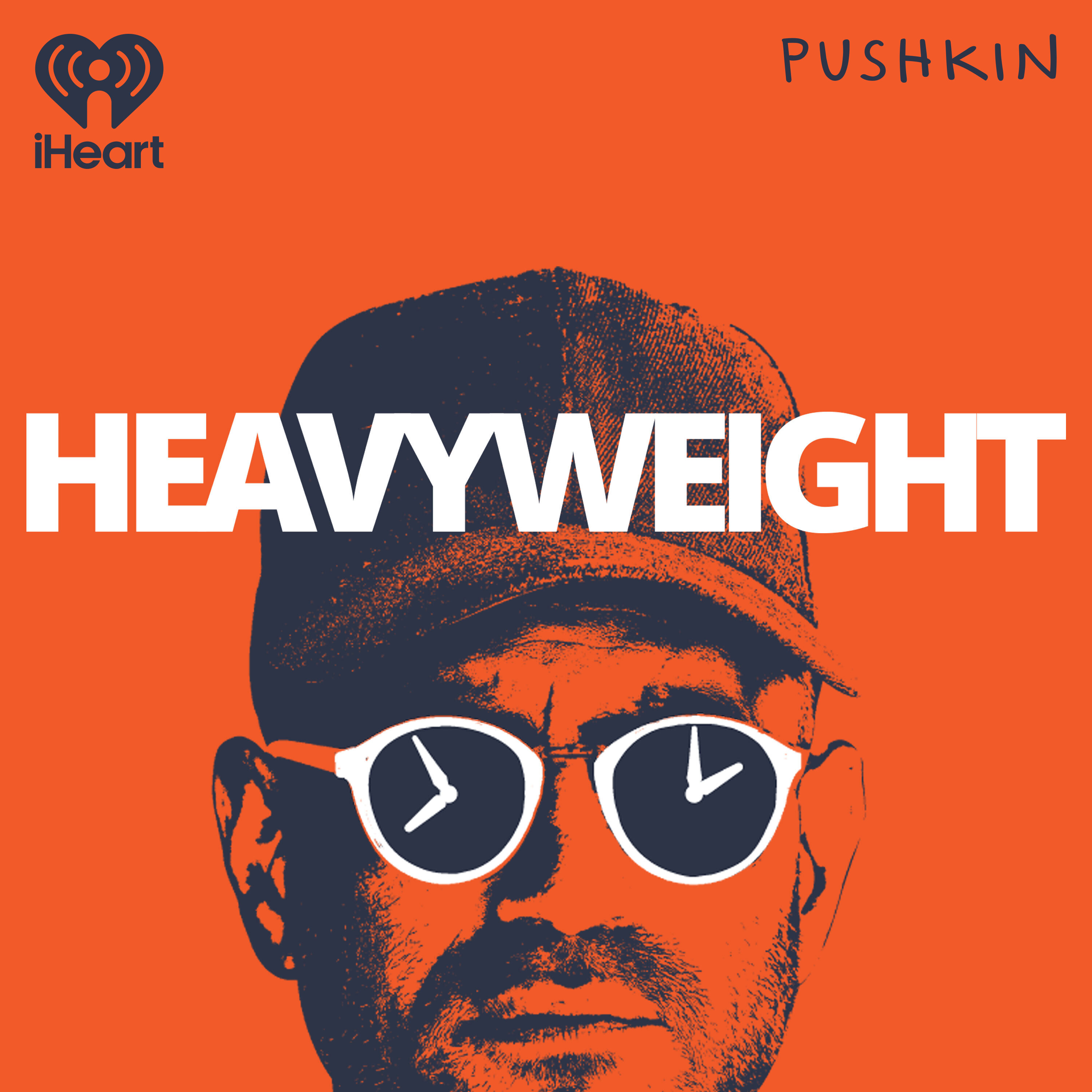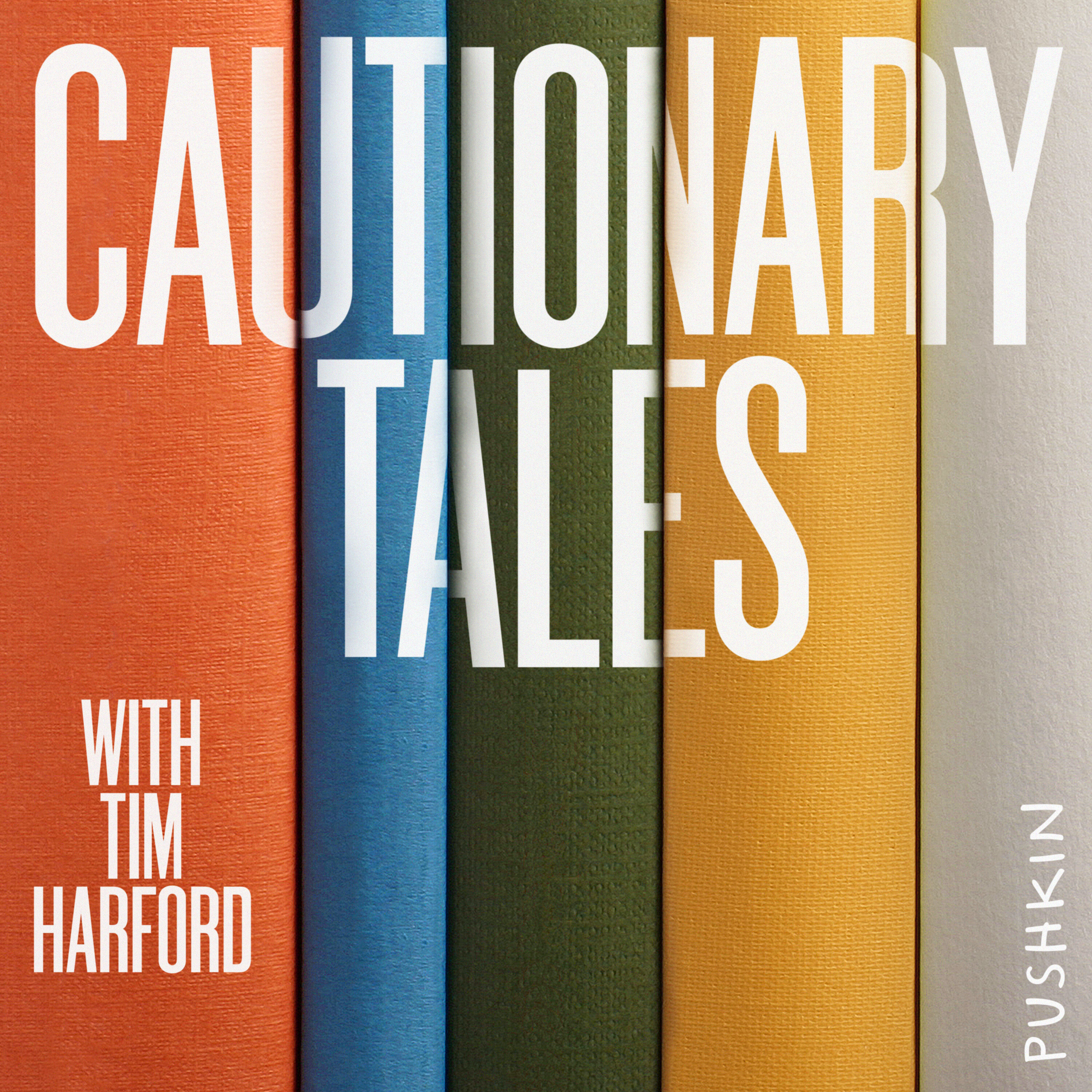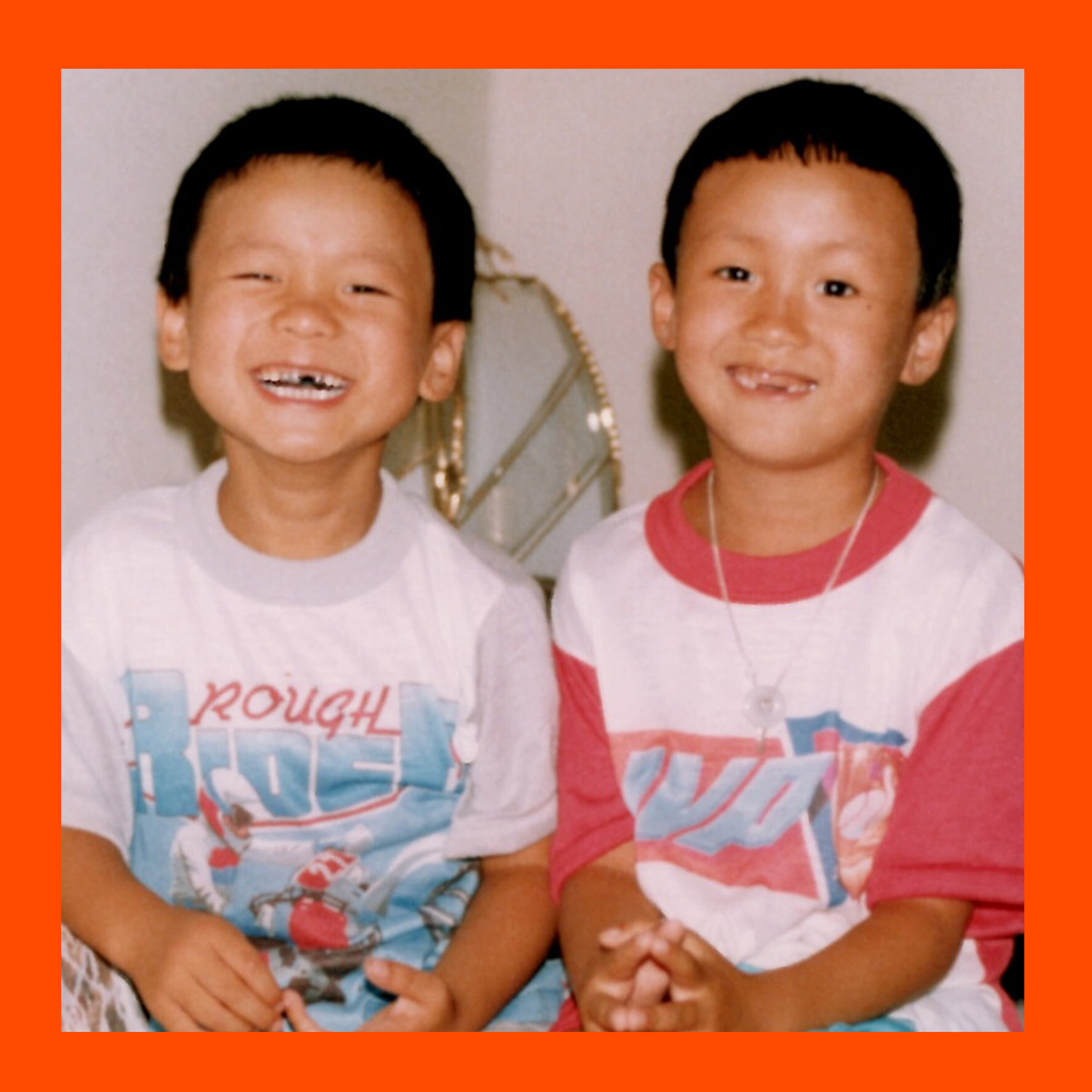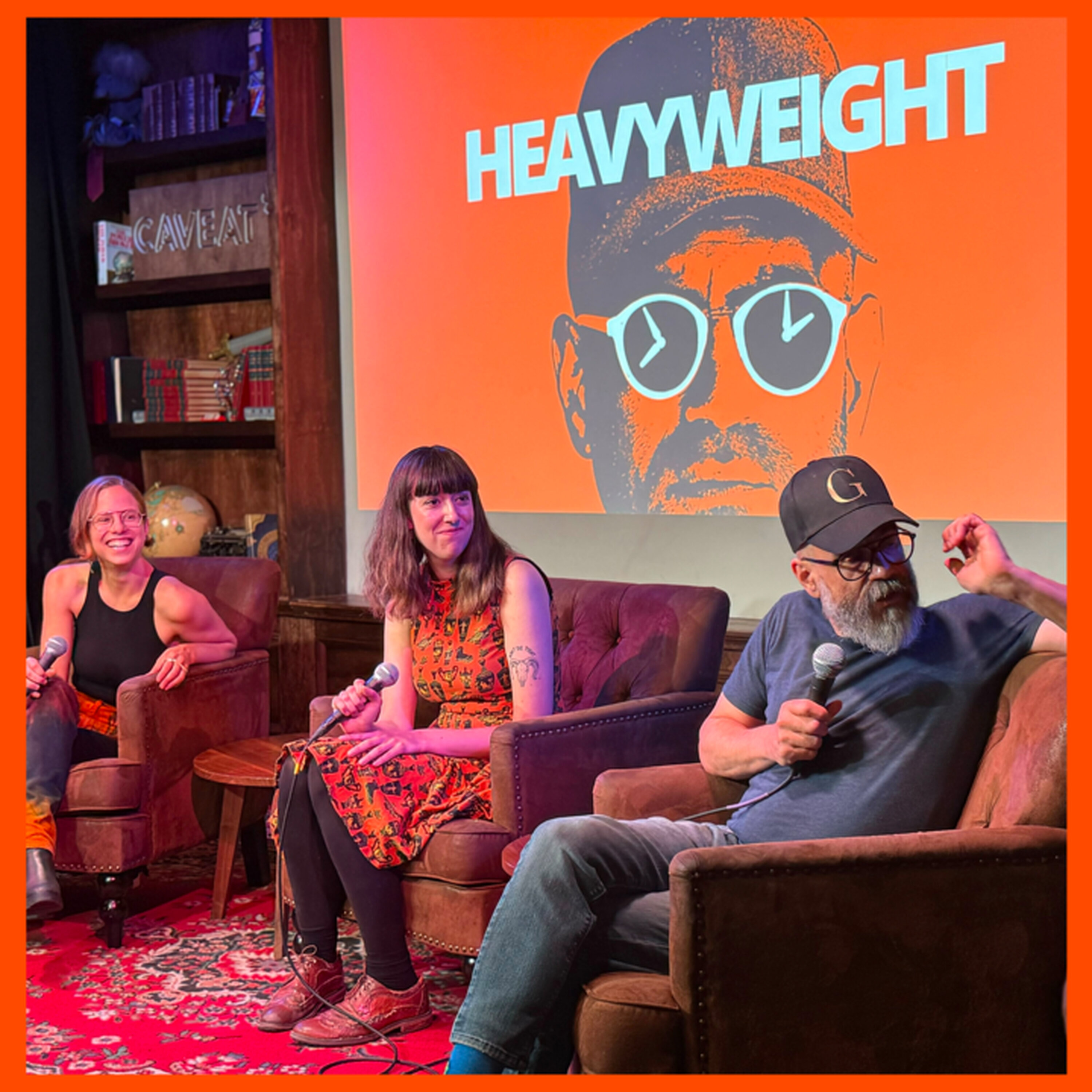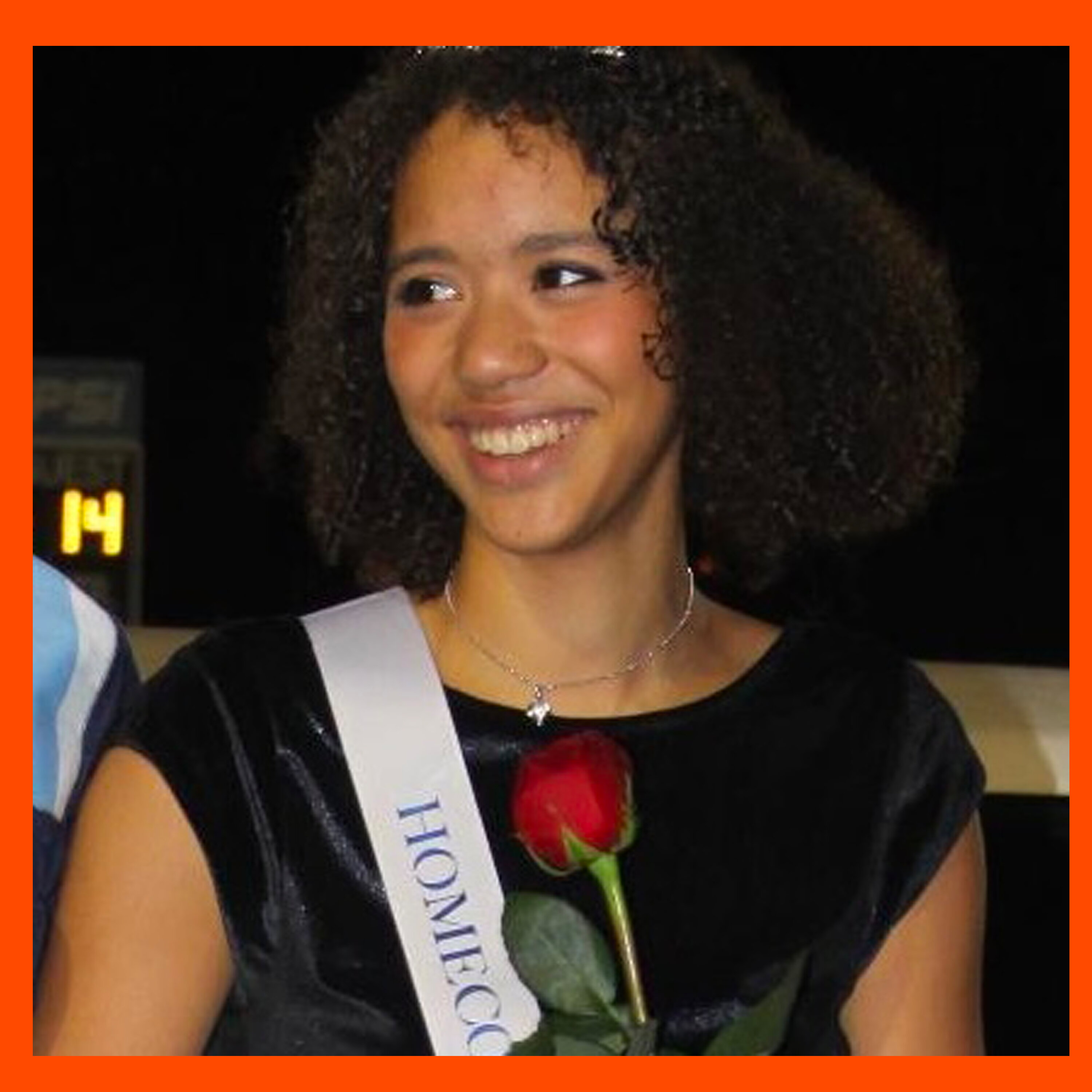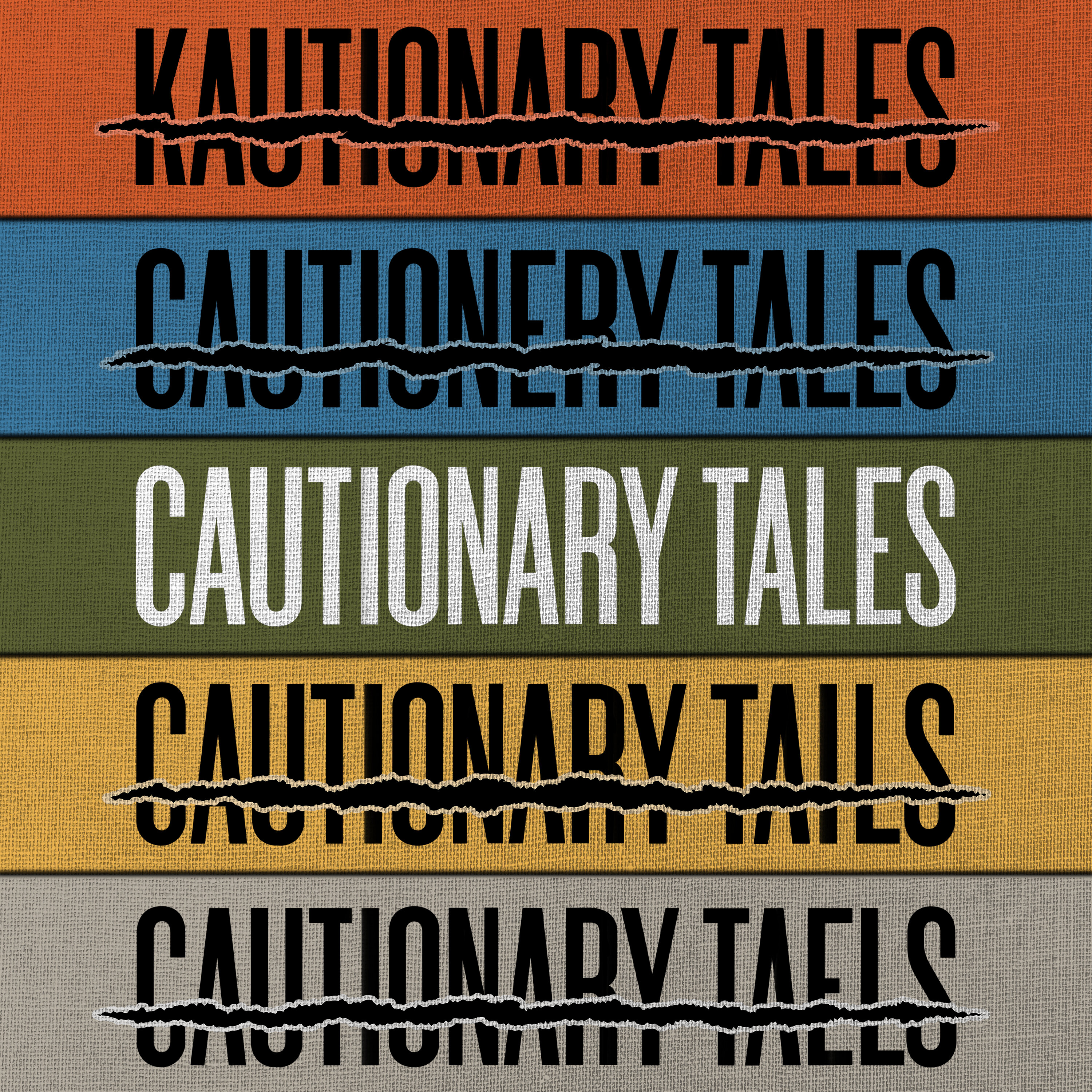Heavyweight Short: The Sharing Place
Press play and read along
Transcript
Speaker 1 Hey everyone, Jonathan here. This week, we're re-releasing a story of mine from This American Life about a grief counseling center for kids called The Sharing Place.
Speaker 1 We wanted to play this story for you because it involves some of the same things that we talk about on Heavyweight, where I often find myself speaking with adults who are grappling with traumatic moments from the distant past.
Speaker 1 But in this story, I'm talking with children who are grappling with those moments in the present as kids. That's coming up right after the break.
Speaker 1 A quick warning, this story involves children talking to adults about death and other sensitive subject matter.
Speaker 3 This is an iHeart podcast.
Speaker 5
On Fox One, you can stream your favorite news, sports, and entertainment live, all in one app. It's fing roll and unfiltered.
This is the best thing ever. Watch breaking news as it breaks.
Speaker 5 Breaking tonight, we're following two major stories. And catch history in the making.
Speaker 7 Give me me free.
Speaker 5 Debates,
Speaker 2 drama, touchdown.
Speaker 5
It's all here, baby. Fox One.
We live for live.
Speaker 6 Streaming now.
Speaker 8 In today's super competitive business environment, the edge goes to those who push harder, move faster, and level up every tool in their arsenal. T-Mobile knows all about that.
Speaker 8 They're now the best network, according to the experts at OCLA Speed Test, and they're using that network to launch SuperMobile, the first and only business plan to combine intelligent performance, built-in security, and seamless satellite coverage.
Speaker 8
That's your business, Supercharged. Learn more at supermobile.com.
Seamless coverage with compatible devices in most outdoor areas in the U.S. where you can see the sky.
Speaker 8 Best network based on analysis by OCLA of Speed Test Intelligence Data 1H 2025.
Speaker 9 There's more to San Francisco with the Chronicle. More to experience and to explore.
Speaker 9 Knowing San Francisco is our passion.
Speaker 9 Discover more at sfchronicle.com
Speaker 1 There's a house in Salt Lake City where kids come to have death explained to them. Not just that people die, but how they die.
Speaker 1 It's called the sharing place, and the first person they meet there is Jill McFarlane. This is how she explains a heart attack.
Speaker 10 Your heart stopped working and couldn't move your blood through your body.
Speaker 1 She has a quiver full of kid-sized explanations for all the ways that life can end, like kidney failure.
Speaker 10 Your kidneys are washing machines for your blood, and when your blood, they stop working and your blood's dirty, then it poisons your body and you die.
Speaker 1 Overdoses?
Speaker 10 Overdose is when you have a sickness in your brain called addiction, and addiction makes you take medicine that's not good for you, and you take way too much of it. But not all medicine's bad either.
Speaker 1 Have you dealt with murder?
Speaker 10 It's when somebody chooses to make your body stop working, it's a choice. We also do choice and not choice.
Speaker 10 Like murder is a choice, cancer is not a choice. We also do contagious or not contagious, like you're not going to get my depression, and you're not going to get my cancer.
Speaker 1 The Sharing Place is a grief support center for kids who've lost a family member. It's one of hundreds of centers like it around the country.
Speaker 1 Kids sit in support groups led by grown-ups, but the point is to allow children to talk to other children about their grief. They're encouraged to speak in concrete language about death.
Speaker 1 Because the thinking goes, that's how to process death's finality. So people don't pass pass away, you don't lose them, they die.
Speaker 1 We invest so much effort trying to shield kids from the scary things in life. We place advisories before TV shows that warn against inappropriate language and subject matter.
Speaker 1 And what could be less appropriate than death? So for all we let on, bunnies lay eggs, your mother means well, and life pretty much goes on forever.
Speaker 1 To do otherwise feels like you're breaking a basic pact that grown-ups have with one another.
Speaker 1 Who did you have die?
Speaker 13 My dad, two guinea pigs, a dog,
Speaker 11 two cats,
Speaker 7 and
Speaker 13 my dad. And that's all.
Speaker 1 The kids here are more comfortable talking about death than most adults are. Like Haley, who lost a sister and brother to mitochondrial disease.
Speaker 1 She and her other brother have the disease too, but not as bad. They've had to deal with something that most other people haven't had to, let alone other kids.
Speaker 1 So it's hard to talk about with the kids at school.
Speaker 14 Sometimes they don't even know what we're talking about.
Speaker 14 Because we know all this stuff, like all these words that nobody's heard, like none of the other kids heard about, like
Speaker 14 neurological or something like that. And they're like, what does that mean? Or like a feeding tube? What does that mean?
Speaker 11 And it's.
Speaker 13 It's really hard to explain.
Speaker 14 it's not hard to explain but it's hard to like
Speaker 14 tell them and
Speaker 14 they still don't know understand where it goes or what it does to help you
Speaker 1 but this is a place where kids do understand
Speaker 1 there are more than a dozen separate groups at the sharing place broken down by age the groups meet twice a month for about an hour and a half in a refurbished house made to feel homey and safe so it's like visiting your grandma's.
Speaker 1 There are rooms where kids meet and talk and rooms where their parents do the same, but most of the rooms are dedicated to play.
Speaker 1 There's a costume room where kids can dress up like police, ballerinas, cowboys.
Speaker 13 I'm Spider-Man, so you can do whatever I tell you to do.
Speaker 1 And beside it is a room called the Soft Room, which is full of props and toys, including an old telephone.
Speaker 1 One little girl who watched her mother have a heart attack spent an entire play session pretending to call for help.
Speaker 1 Hi, 911, she'd say. My grandma's dying.
Speaker 2 Hurry, come quick.
Speaker 1 Then she'd hang up and dial again.
Speaker 1 Hi, 911, my dad's dying.
Speaker 2 Hurry, come quick.
Speaker 1 One of the most popular rooms is a padded room called the Volcano Room.
Speaker 11 I'm gonna go play in the volcano room.
Speaker 1
It's full of cushions and large rubber yoga balls. It's even got an adult-sized dummy to wrestle and punch.
The kids can scream, yell, pound the walls, and throw things around.
Speaker 1 They love it.
Speaker 1 It's a release.
Speaker 1
Eve is nine years old, and her father died about two years ago. She knows that feeling of keeping it all bottled up inside.
She says she can go days at school like that.
Speaker 13 It kind of feels
Speaker 13 really overwhelming, and it's like you'd like don't know what to do
Speaker 13 and on the inside it's like hurting somehow in like feel a feeling way.
Speaker 11 It like hurts somehow.
Speaker 1 Where do would you say it hurts?
Speaker 13 Usually
Speaker 13 with me it would hurt in the throat and kind of in my stomach.
Speaker 13 It's like
Speaker 13 something that needs to come out, but just I really need to learn how to do that.
Speaker 12 I think there are people who
Speaker 16 in this world who can grow up and don't really know how to talk frankly about lots of things.
Speaker 1 Nancy Riser is one of the co-founders of The Sharing Place. And this is what she says when children ask her how people die.
Speaker 11 Well, close your eyes and listen.
Speaker 11 And there isn't the next breath. Does it hurt? I don't think so.
Speaker 12 I don't think so. Their face doesn't look like it hurt.
Speaker 1 Nancy's a therapist who works with young children. For a long time, the very concept that children do, in fact, grieve was hotly disputed.
Speaker 1 Freud said that it was difficult for children to even conceive of such loss. And as a culture, Nancy says, that's pretty much the idea that we operate under.
Speaker 12 Oh, look, she's playing. She's okay.
Speaker 12 She didn't really understand what happened. Well, she's playing, but then half an hour later, she's in the house holding her teddy bear and sucking her thumb and crying.
Speaker 12 So we need to let people know that children
Speaker 11 grieve.
Speaker 12 and help them when they grieve so it's not stuck inside and comes out when they try to have a relationship later.
Speaker 12 When they start to get intimate, wham, they cannot bear it and they go off and they don't know why.
Speaker 1
Nancy says children just grieve differently than adults, especially little children. They grieve in fits and starts, they can't focus on it for very long.
And grief is more physical for them.
Speaker 1 They'll act out their anger, maybe kick a door, which is the reason for the volcano room at the sharing place.
Speaker 1 They might also regress, suddenly using baby talk or sucking their thumbs, and if they're potty trained, they might become untrained. They're also magical thinkers.
Speaker 1 I heard stories of kids who were afraid to go to sleep because grandma went to sleep and didn't wake up. One little boy wandered away from his mom at the emergency room saying, I'm looking for dad.
Speaker 1 We left him here last time. Another boy said he just wanted to die for a few days so he can go to heaven and teach his little sister how to ride a tricycle.
Speaker 1 Children also regrieve, that is, with every new stage of development, they experience their grief anew.
Speaker 1 And with every milestone, when their braces come off, when they get their driver's license, when they graduate, they'll inevitably think, I wish my mom was here.
Speaker 1 And given all of this, the thought behind the sharing place and other centers like it is that kids can help one another in a way that adults perhaps can't help them.
Speaker 1 That's why they're brought together in these groups. In short, kids speak the same language.
Speaker 4 Is that thing turning on, baby? It is turned on. What do you think about that?
Speaker 1 Before their session at the sharing place, I sit down with Gavin, who's six, and his brother Aiden, who's eight. They're both dressed in matching long-sleeve polo shirts.
Speaker 1
Gavin sits on his mother Nicole's lap. Aiden sits beside them.
Oh, do you want to introduce yourself?
Speaker 13 Hi, um, I'm Aiden.
Speaker 13 Um, my dad died
Speaker 17 bus.
Speaker 17 Suicide? Suicide.
Speaker 1 His little brother, Gavin, points his finger to his head and pulls the pretend trigger. He snaps his head back.
Speaker 11 Yep, that's what happened.
Speaker 1 What did you just do there?
Speaker 13 He shot his head.
Speaker 13 And then
Speaker 13 we didn't know he was dead, right, Mama?
Speaker 17 We didn't.
Speaker 13 And then we
Speaker 13 then we said, Wake up, Dad.
Speaker 17 No, you didn't see him. Mommy found him.
Speaker 17 And he was already he was already dead.
Speaker 13 Did you turn him over?
Speaker 17 I didn't touch him.
Speaker 11 Okay.
Speaker 13 She knew he was
Speaker 13 dead because she saw blood and things
Speaker 1 on his head.
Speaker 11 Yeah.
Speaker 14 And he was like a terrific guy.
Speaker 13 So nice, so generous. He would always help anyone.
Speaker 13 He was a terrific guy.
Speaker 18 What did you learn here that helped you the most?
Speaker 13 To understand how he died.
Speaker 1 Sometimes that task, telling the kids that their parent committed suicide, falls to Jill McFarlane because the surviving parent or guardian might be so inside their own grief that they can't bring themselves to do it.
Speaker 1 Jill explains suicide as simply as she does other kinds of death. There's a sickness in your brain called depression, she says, and it can make you decide to make your own body stop working.
Speaker 1 She says it's required that the kids know how their brother or sister or mother died before starting the group.
Speaker 10
I had one family say he died because he was sick. One family said that he died in a car accident.
One family said that he accidentally shot himself. He didn't mean to.
Speaker 1 It was Jill who helped their mom break the news to Aiden and Gavin that their dad shot himself. She says that conversation was especially hard.
Speaker 10 The boys immediately said,
Speaker 10
you don't know my dad. Why would you say that? You don't know us.
And I said, I know, I don't know you. But your mom's here today because
Speaker 10
she needed my help in telling you this because this is a really hard and scary thing that happened. And your mom told me that that's what happened.
And Aiden just was like, You're crazy, lady.
Speaker 10 There's no way that we're going to talk about this.
Speaker 11 This is not what happened. It was horrible and was awful.
Speaker 10
And I cried that whole night. I just, it was just awful.
I just felt so horrible. And my husband was like, You can't do this.
You have to go to the director and tell her that you can't do this again.
Speaker 1 Suicide is always one of the highest, if not the highest, cause of death for sharing-placed families at any given time.
Speaker 1 There's actually a special group devoted specifically to suicide, and a lot of the stories you hear in that group are so horrible that you can't help but wonder, why tell the kids what happened at all?
Speaker 1 Why not just say they died and leave it at that?
Speaker 1 According to Jill and her colleagues, we need to tell children so they won't find out later in life and wonder, what else did they lie to me about?
Speaker 1
They also don't want to have to cloak it in a way that suggests it's unspeakable and shameful. They get enough of that idea at school.
This is Eve again, whose father also shot himself.
Speaker 13 Well, some people at school, they say, this makes me feel really sad too. They say that
Speaker 13 when somebody kills themselves, that means they go to the wrong place. I don't believe that, but it just makes me feel really sad when they say that.
Speaker 13 Like instead of going to a happy place, they would go to a sad. sad.
Speaker 1 But
Speaker 1 even if you don't believe it and you know it's nonsense, it still kind of hurts that someone would say that.
Speaker 13 Yeah, it does, cause I'm like.
Speaker 13 It's like somebody judging
Speaker 13 judging
Speaker 13 my papa.
Speaker 13
Which it's not a bad thing. A lot of people do that.
But you know.
Speaker 13 Just kind of feels a little weird. Like on the inside it makes me feel like I'm gonna scream and like do something like that.
Speaker 1 What are the things that you wish that people would say?
Speaker 13 Probably
Speaker 13 it's okay
Speaker 13 that
Speaker 13 that has happened and
Speaker 13 we can help you with
Speaker 13 feeling better.
Speaker 13 and
Speaker 13 understanding you.
Speaker 13 That's probably something I'd want somebody to say.
Speaker 1 Once a child knows how their loved one died, they're encouraged to say it out loud. There's a kind of sorcery to it, naming the dragon so you can defeat it.
Speaker 1 I sat in on the suicide group, which is different than the other groups in that kids tend to come to meetings for a longer period of time, partly because they didn't get to say goodbye.
Speaker 1 The kids sit in a circle at the beginning of the meeting and hand around a talking stick. One by one, they say their name, who died, and how they died.
Speaker 13 My name is Elise, and the person who died was my dad, and
Speaker 13 he died by shooting
Speaker 13 himself
Speaker 13 with the gun, and
Speaker 13 he wanted to die.
Speaker 13
Hello, my name is Lindsay. My dad died.
He died by suicide.
Speaker 13 And I regret not seeing him because I hadn't seen him for a couple of months before his death.
Speaker 1 There's also a different question they respond to each time they meet. What do you miss most about the person? Is there anything you don't miss? Tonight's question is: What do you regret?
Speaker 13 My name is Ethan, and the person who died is my dad. He died by shooting himself in the head, and
Speaker 13 I don't know if I have any regrets.
Speaker 11 I just can't remember.
Speaker 1 It can take a long time for them to get to this point where they can say the word suicide.
Speaker 1 The sharing place never corrects any of the kids or forces them to say anything they don't want to, but they notice when a child is finally able to say it.
Speaker 1 The night I was there, Aiden, the nine-year-old I talked to who had a hard time saying the word suicide, was finally able to say it in groups.
Speaker 11 So how about Aiden?
Speaker 1 The volunteers sat around and talked about it afterwards.
Speaker 19
It was hard for him, I could tell. He wasn't about to say it, but he said it, and I was proud of him.
But it took him probably at least a minute to actually get those words out.
Speaker 1 He had to ask his mom if it was okay to say.
Speaker 18 So she wasn't coaching him.
Speaker 11 No problem or anything.
Speaker 1 Okay. It was good.
Speaker 1 On the other hand, Aiden's brother Gavin, the six-year-old, talks about his dad's suicide incessantly. He also draws guns during playtime and even sculpts them out of Play-Doh.
Speaker 1 This is Joel McFarlane again.
Speaker 10 He tells everybody at school, my dad shot his brains, and it freaks everybody out. And so then he gets in trouble at school, which then he was like, well, I guess I can't ever talk about my dad.
Speaker 10 But this is how kindergartners talk and process things. It's just easy for them to talk about, but it scares other people.
Speaker 1 Is it okay for kids, other kids in their class to hear that kind of thing?
Speaker 10 Well, yeah.
Speaker 10 I mean,
Speaker 10 is there a right answer to that? I don't know.
Speaker 1 I don't know either. If I were a parent, I'm not sure I'd want my kid hearing that kind of thing at school.
Speaker 1 And while Jill doesn't have an answer, she does think kids being allowed to express themselves is much much healthier than sending them a message that it's wrong to say this kind of stuff out loud.
Speaker 1 And that's got to be a step in the right direction.
Speaker 15 I have very, very, very fond memories of this place. I actually tried to come through the side door because that was the door that I always came in through.
Speaker 15 And then I was like, I can use the adult entrance finally.
Speaker 1 Sarah Muhammad hasn't been to the sharing place for a a full six years. She's 21 now, but when she was 11, her older brother hanged himself.
Speaker 1 Even though he was supposed to be babysitting her, her parents had told her to keep an eye out on him because of his past suicide attempts.
Speaker 1 Obviously, what happened wasn't her fault, but she blamed herself, which is something I heard other kids here talk about too. It's easy for an adult to say, don't be silly, it's not your fault.
Speaker 1 But it's a whole other thing to talk with a kid at the sharing place who says, I know exactly what you're talking about.
Speaker 15 It was kind of nice seeing the older kids whose
Speaker 15 loved ones had been gone for a few years, how they were able to
Speaker 11 go to school normally and
Speaker 15
just live their normal lives. Because I just didn't want to go to school.
I didn't want to be with
Speaker 12 kids who just didn't know.
Speaker 15 It was just, it was too hard.
Speaker 1
I asked Sarah if there was a turning point, a moment when she began to feel like maybe she was doing a little better. She said yes.
She was in the courtyard with a bunch of other kids.
Speaker 15 We were just out there painting rocks or something for a fundraiser, and
Speaker 15 we were just talking, just talking like normal. And I realized that I hadn't had a conversation like that
Speaker 2 in
Speaker 15 about a year, just where I felt 100% free and just laughing and not feeling guilty about laughing and
Speaker 11 just happy.
Speaker 15 And that was,
Speaker 15 yeah, that was really the first time in
Speaker 11 a good nine months after my brother had passed that I felt
Speaker 11 okay.
Speaker 1 It's the kids themselves who decide when they're ready to stop coming to the sharing place, but on average, they stay about two years.
Speaker 1 When they're ready to leave, they have to announce their intention two times in group before their final goodbye.
Speaker 17 Any of you that would like to say something to him, which I'm sure several of you will.
Speaker 1 The goodbye is ceremonial, and on the last night I was there, at the end of the meeting, they said goodbye to a kid named Robbie.
Speaker 1 He sat in the circle with the other kids and volunteers, and anybody who wanted to could pick up the talking stick and say a few words. His friend Jessica was the last kid to do so.
Speaker 20 I'll definitely miss you because you're like one of my best friends in this group and I'll miss seeing you
Speaker 20 and our major fight that we had in the volcano room.
Speaker 20 It was not my fault.
Speaker 18 You asked for it. No, I didn't.
Speaker 17 Yes, you did.
Speaker 11 No.
Speaker 20 It was just really fun and I'm gonna miss seeing you and miss hanging out with you.
Speaker 1
At Robbie's last meeting, there was a kid who'd just shown up. It was his first meeting.
He had long bangs hanging over his eyes and except for his name, didn't say anything the whole time.
Speaker 1 Whenever a new person joins, the veteran kids have a chance to gauge their own progress to remember what they were like when they first showed up and think about how bad it used to be and how now it isn't as bad.
Speaker 1 And ultimately, like Robbie, they'll make way for someone on the long-waiting list, a list on which new names are added all the time. They'll say, I think it's time to go.
Speaker 1 And then they'll say it again.
Speaker 1
This story originally ran on This American Life in 2015. It was produced by Sean Cool.
Special thanks to the team at This American Life for letting us share it here.
Speaker 1 It was mixed for Heavyweight by Emma Munger with music by Christine Fellows, Blue Dot Sessions, Bobby Lord, and Poddington Bear.
Speaker 1 If you're feeling depressed or just want someone to talk to, you can call the National Suicide Prevention Lifeline at 1-800-273-8255.
Speaker 1 Since this story originally aired, the Sharing Place has expanded to three locations in Utah and also partners with local schools and organizations.
Speaker 1 You can find out more about their work at the sharingplace.org.
Speaker 4 This is Justin Richmond, host of Broken Record. Starbucks pumpkin spice latte arrives at the end of every summer like a pick-me-up to save us from the dreary return from our summer breaks.
Speaker 4 It reminds us that we're actually entering the best time of year, fall. Fall is when music sounds the best.
Speaker 4 Whether listening on a walk with headphones or in a car during your commute, something about the fall foliage makes music hit just a little closer to the bone.
Speaker 4 And with the pumpkin spice latte now available at Starbucks, made with real pumpkin, you can elevate your listening and your taste all at the same time. The Starbucks pumpkin spice latte.
Speaker 4 Get it while it's hot or iced.
Speaker 18 You've probably heard me say this. Connection is one of the biggest keys to happiness.
Speaker 18 And one of my favorite ways to build that, scruffy hospitality, inviting people over even when things aren't perfect. Because just being together, laughing, chatting, cooking, makes you feel good.
Speaker 11 That's why I love Bosch.
Speaker 18 Bosch fridges with VitaFresh technology keep keep ingredients fresher longer, so you're always ready to whip up a meal and share a special moment.
Speaker 18 Fresh foods show you care, and it shows the people you love that they matter. Learn more, visit Bosch HomeUS.com.
Speaker 3 What happens when Delta Airlines sends four creators around the world to find out what is the true power of travel?
Speaker 21 I love that both trips had very similar mental and social perks.
Speaker 22 Very much so. On both trips, their emotional well-being and social well-being went through the roof.
Speaker 3
Find out more about how travel can support well-being on this special episode of The Psychology of Your Twenties, presented by Delta. Fly and live better.
Listen wherever you get your podcasts.
Speaker 3 This is an iHeart podcast.
